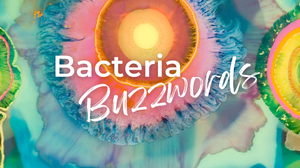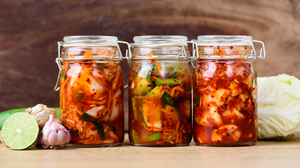
We sat down with Fiona, our PrecisionBiotics dietitian, to talk about all things gut related. From the function of the gut, to the gut microbiome, you are guaranteed to learn something new about how our guts work.
Where did your interest in the gut start?
My interest in the gut started when I was in my final year of my undergraduate degree in nutrition. For my dissertation, I looked at the factors influencing the gut microbiome of infants from birth up to the age of five.
I was fascinated about the range of factors that we found may influence the gut microbiome of infants and how the number and types of bacterial species were unique to each infant.
This led me to develop an interest in how the gut microbiome can be influenced, especially through what we eat.
Can you tell us what the function of the gut is?
The most obvious function of the gut that most people would know is the digestion and breakdown of the food that we eat.
However- the gut is now known to play a very important role in several other functions in the body.
For example, the bacteria that make up our gut microbiome are now known to have an important role in supporting our immune system.
These bacteria also produce a range of chemicals, hormones and other substances that can influence how our body functions through many different pathways.
So what does normal gut function actually look like?
Gut function is very unique to each individual and there is no ‘normal’ gut function.
What one person considers to be normal may not be normal to another person.
What is important is to listen to your body and be mindful of any changes in your gut and any changes to what you consider to be normal.
What’s the gut microbiome?
The gut microbiome is a term used to describe all the micro-organisms, such as bacteria, yeast and fungi, that live in our gastrointestinal tract, and their genetic material.
Within our bodies we have different microbiomes such as the skin microbiome- however, our gut microbiome is the biggest one.
What’s the difference between the microbiota and microbiome?
You may have heard or read about the gut microbiome or the gut microbiota and while they sound the same and are often used interchangeably, scientifically speaking they are slightly different
The gut microbiota is a term used to describe all the micro-organisms, including bacteria, yeast and fungi, that live in our gastrointestinal tract.
Whereas the term gut microbiome is used to describe these micro-organisms PLUS their genetic material
What are some emerging trends that experts are focussing on when studying the gut microbiome?
The gut microbiome has received lots of interest from researchers and scientists in recent years
One emerging trend that is currently receiving a lot of focus is the role of the gut microbiome in sports performance. Athletes experience a lot of physical, and psychological stress during intense training regimes and this can have a negative effect on their gut microbiomes.
Researchers are focussing on strategies to influence the gut microbiome of athletes and exploring how this impacts how well they perform in training and competition.
Can you tell us something about the gut that we might not know?
One thing about the gut that you might not know, is that it can communicate with our brains.
Research has identified a communication pathway called the ‘gut-brain-axis’ through which our guts and brains communicate.
The easiest way to see the gut-brain axis in action is to think back to when you last experienced having ‘butterflies’ in your stomach when you felt nervous or excited.
Much of this communication is believed to be influenced by the bacteria living in our gut microbiomes and the chemicals and other substances that they produce.
And lastly, what’s one thing about gut health you wish more people knew?
One thing about gut health that I wish more people knew was that it is not just what we eat in our diets than can influence gut health.
Research now tells us that our mental health can influence our gut health- with our stress and anxiety levels having an influence upon our gut microbiomes.
So it is not only important to think about the types of food that you eat, but also to make sure you take time out to relax and develop strategies to reduce stress such as exercise or meditation.
Still, want to know more about the gut? We have plenty more blogs for you. Learn about the gut and stress or how the gut impacts your skin here.
Written By: Fiona Kinnear, PrecisionBiotics Dietitian
Discover more Q&A'S with the team

The IBS Q and A with Priya Tew
Discover the relationship between gut health and IBS with Priya Tew, Dietician.

The Sports Performance Q and A with Katy
We sit down with our in house dietician to go through how the mind and sports performance are connected as well as some brilliant tips on how to reach your peak performance.

The Brain Health Q and A with Abbie
Discover how our brain and gut are connected with Abbie Alston, PrecisionBiotics Nutritionist
Shop Alflorex
Gut and Brain Supplements

Related Articles








